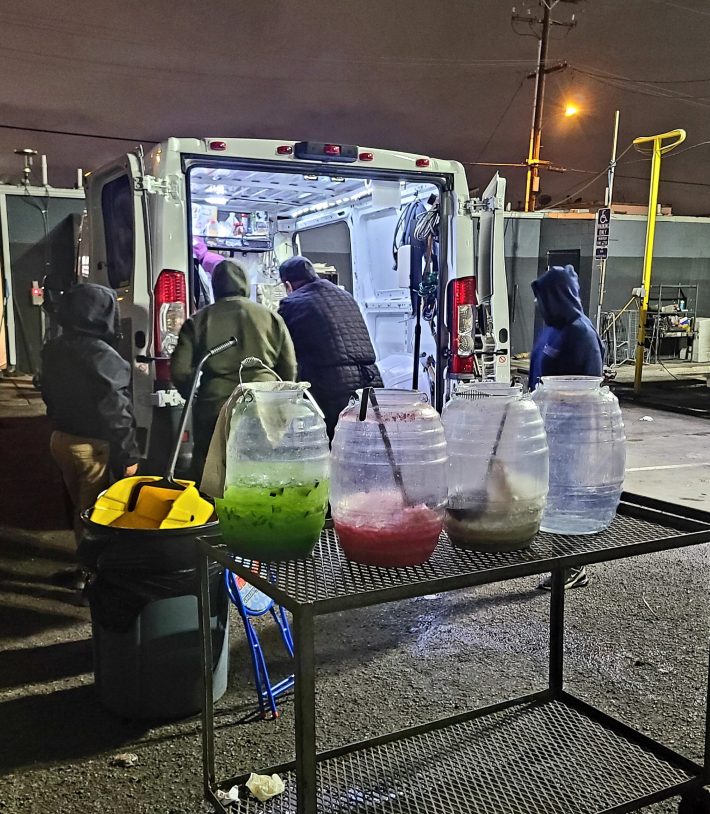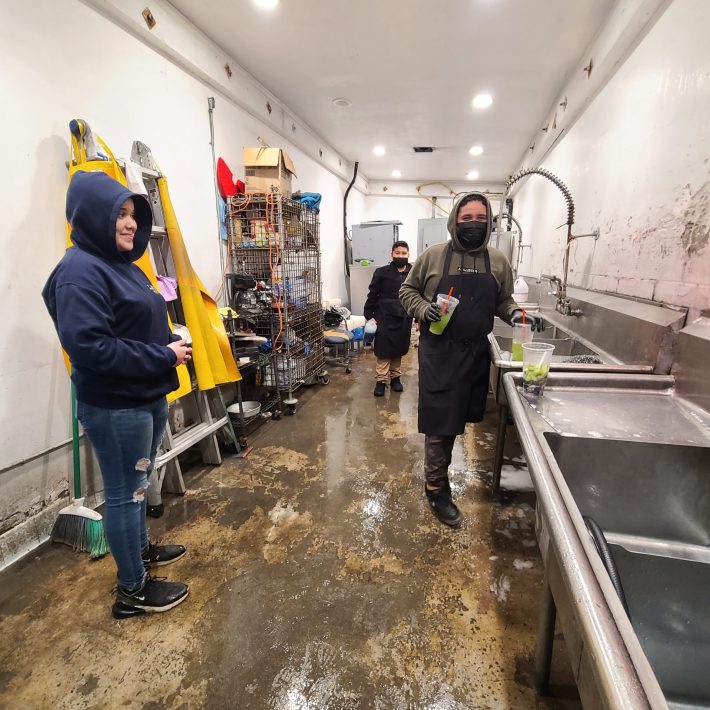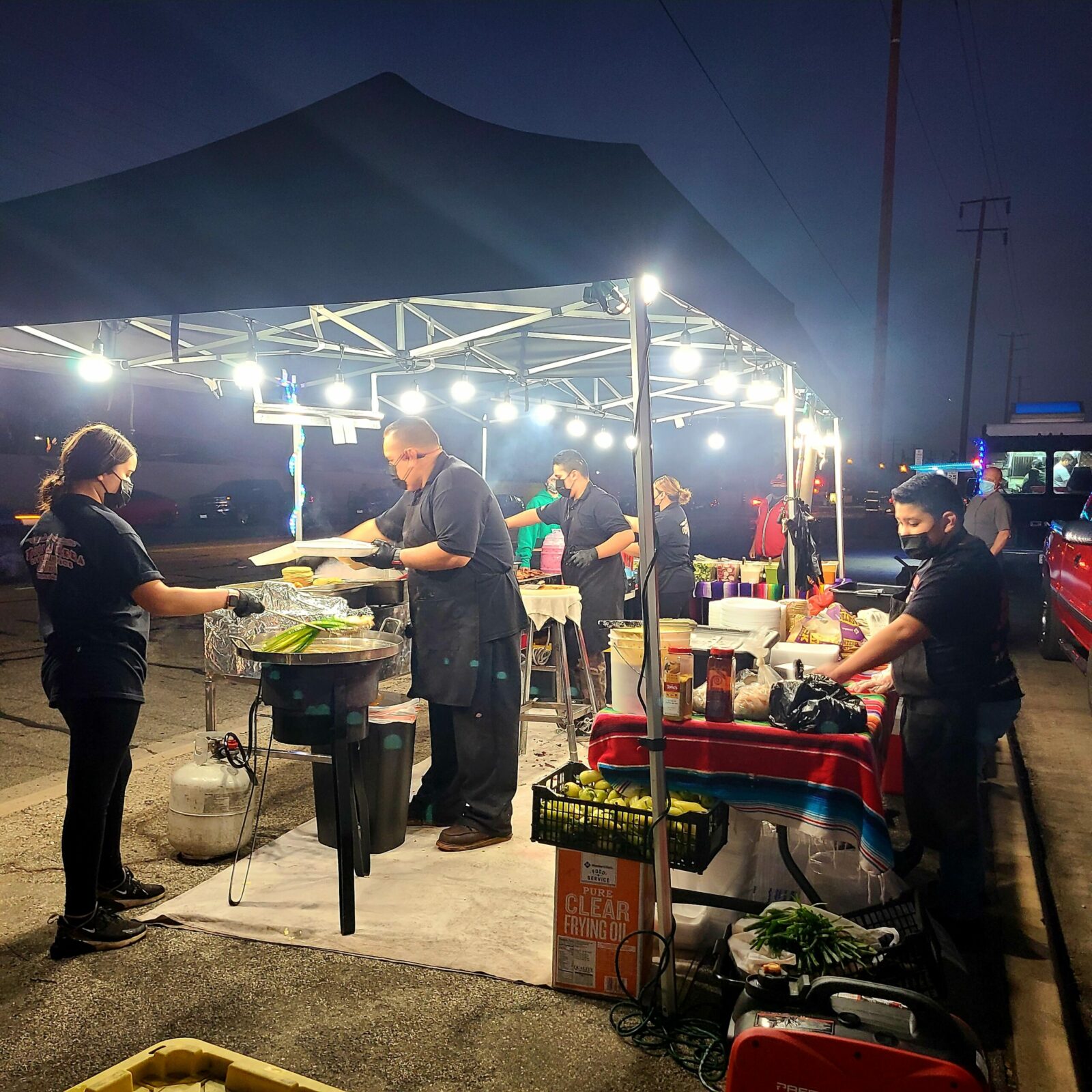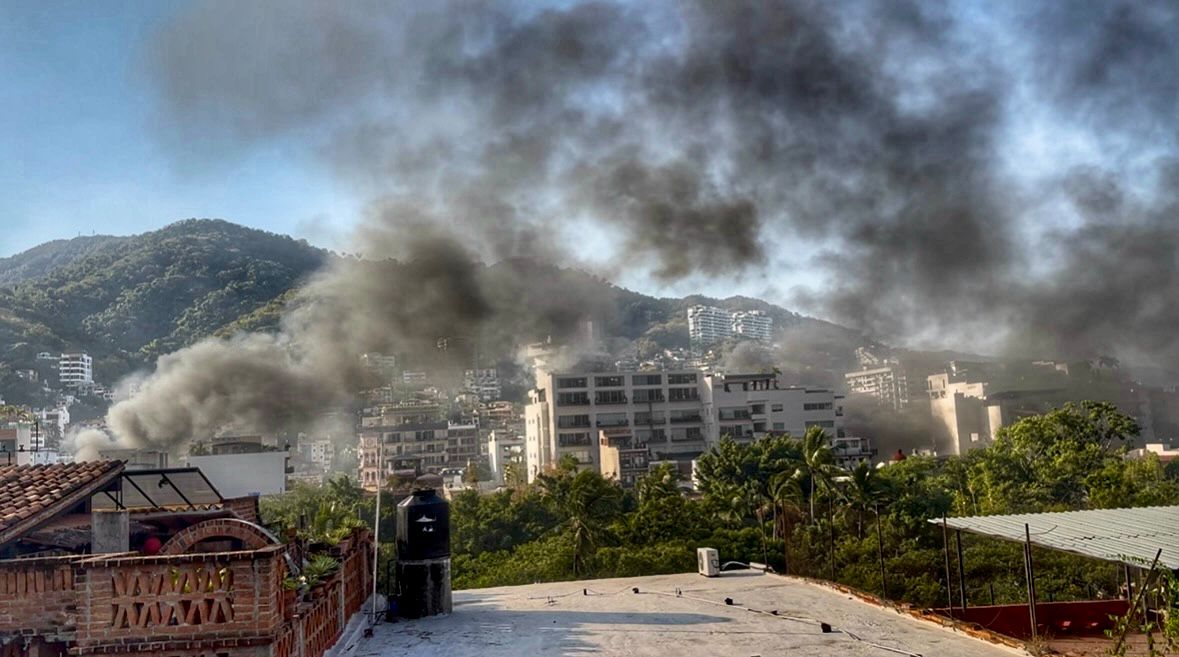[dropcap size=big]I[/dropcap]t’s 3 PM, and the Meza family is loading up the van to start their long day full of street vending. Vicente, the head of this family-run operation, oversees the prep line: the slicing and dicing of the vegetables, his youngest daughter add ice to their horchata made from scratch, the last fresh strawberry is added into the agua de fresa, and all oversized jugs of the aguas frescas are loaded into the van.
Meanwhile, Vicente’s wife, Lizeth, is monitoring their family’s famous frijoles rancheros and washing dishes.
Vicente points to their built-in water purifier and asserts that they only make their aguas frescas with purified water, dispelling the age-old myth in Mexico of agua fresca being made with unfiltered water. “We make sure our customers drink good delicious clean water! We need to them to return!” He tells L.A. TACO.
Once the van is fully loaded, Vicente and his wife do a quick run down with their son, who is in charge of strapping everything down to make sure they don’t forget anything. Lizeth explains why they have a routine before they leave, “Time is money, and we can’t lose our spot. That’s a big issue all taqueros have. It's hard finding a good spot [in the street]. We had a great spot in La Puente, but the city (La Ciudad) called on everyone. We were disappointed because it was a safe spot, and the neighbors we talked to were very nice to us and became our friends. But what can you do?”

The family unloads the van in the city of Azusa right off of Arrow Highway. The pop-up tents go up first, then the grill and tables. Vicente is upset that he didn’t arrive earlier and is afraid that the lunch truck who came before him would call the police on them again. The last time they set up, a police officer told him the taco truck called to complain but that he would let him finish his day and not ticket him.
The entire setup happened in 30 minutes. Before they started to sell, they sanitized the cooking equipment one last time. The last thing they set out was their hand sanitizer machine for their customers.
The two oldest children, Stephanie and Haven, handle the fryer and chop all the meat for the tacos. Jayden, their youngest son, serves the aguas fresca and packages all the orders while the parents take orders, handle the money, and do the cooking, respectively. As the day’s hungry customers start to show up, it’s immediately evident that the family-turned-team of five is very efficient and has their system down. Everyone is helping each other out and making the line go smoothly and quickly.

As the customers wait for their order, the Meza family hands each customer a complimentary small cup of their frijoles rancheros. “We give this out to everyone who passes by. It's like our gift of appreciation, just for coming out and maybe trying our food.” As the hours go by and the sky gets darker and colder, it begins to rain. They start to talk to each other as one big team and say they’re going to call it a night with the following three customers. When asked how the youngest, Jayden, enjoys being a taquero. He replies, “I love it, being to work as a family and team it's really fun. But I worry if we’re going to get chased all the way home like the last time by the bad guys.”
In January, the Meza family tried a new undisclosed spot to sell their food. A customer recommended it, so they tried their luck. They were eventually confronted by two men who told them to leave and weren’t welcome there. So they packed up and drove to a new location. That is when the family noticed that the men followed them, waved a gun, and threatened them. They packed up their van and rushed home for safety. When they got home, they noticed that the same two men had followed them to their home. He said he’s never been in a situation where he’s been followed all the way home. He’s just thankful that he has cameras around the house and neighbors to call on for help. That night, the men eventually left them alone but this harassment on the job is part of a day’s work for street vendors who risk their safety by doing their business in sometimes dangerous neighborhoods.
As the last customers for the night leave, they give them extra food so that they get to take it home and share it with their families. They try not to waste food. They then head over to a commissary space where they wash all their equipment at the end of each night; it’s near the USC Medical Center. Vicente says it’s a spot where he used to have his lunch truck. They unload the van, and the kids took out all the utensils and the jugs to be washed.
View this post on Instagram
A post shared by Tacos La Güera Vicente Meza (@aguasfrescaselbuensabor62320)
As they wash their cooking gear, Vicente and Lizeth share the difficulties they’ve had during this pandemic. Vicente said once his old food truck broke down, it was all downhill for him. “I worked really hard to buy that truck, but once it broke down, I couldn’t afford to repair it. So I made a hard decision and junked it. All they gave me was $300. With no truck and the peak of COVID-19 happening, I knew I couldn’t make any money. I fell into depression, and it affected my family. Bills were piling up, and our rent was due, so I started working for all the [food] delivery services.”
He shares that he spent more money on gas and car maintenance than the money he earned. “As a man and a father, knowing when you can’t provide for your family, it affects you differently.” He is crying while scrubbing his grill. “Qué más puedes hacer? But I’m blessed to have my wife. She told me that we’d get through this. We will, and maybe soon we can afford a lunch trailer again.”
Meanwhile, their kids joked around with each other as they did dishes. “Yes, we’re one big family, and we’re a team. We help our family make money,” says Stephanie. “This helps pay the rent, the clothes, and our cell phones. We’re fortunate to have some nice things that some kids don’t have. But to have those nice things, we must work.”
“I hope people understand that it's just more than tacos. And when my kids get older, they can look back and read this and know that their parents never gave up.”
Her brother Haven jumped in, “We love being out here with our parents and helping out...we still have to come out and make money. How are things going to get paid? We’re a team, and we work together.”
“I hope people understand that it's just more than tacos. And when my kids get older, they can look back and read this and know that their parents never gave up.” Lizeth then started saying, wiping her own tears from her eyes. “I went looking for work, and I was hired as a factory worker. I was making little to nothing, and the company wasn’t providing anything to protect the employees from COVID. So I left that place for my health and my family's safety. When I got home, I told my husband to make me aguas, and I would sell them on the street.”
At first, Lizeth says that this new street food concept pivot did really well and that she was selling out every day, even growing to another location. Then the weather changed to colder temperatures, and the sales dropped. Now that the weather is starting to pick up again, they’re hoping to return to their old sales.
They’re right. It’s about more than just tacos.
Follow the Meza family on their Instagram page and try their delicious food and aguas frescas, @aguasfrescaselbuensabor62320.






